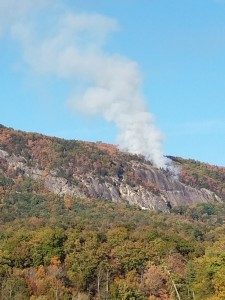Recent wildfires test our planning
By Steven Andrew Jackson, Esq.

Wildfires continue to burn in Western North Carolina, with tens of thousands of acres burning, and the fire departments working hard to control the blazes. People are scrambling with what to do with important items in their household in case they need to evacuate. The same was true of impending flood during the hurricanes as people were told to evacuate to higher land. An emergency of any kind causes us to panic as we scramble to protect our loved ones, pets and personal property.
Of course take care of your loved ones and pets first. Beyond that we are often overwhelmed by other pressing issues – where will we stay, how long will this last, what may we lose? While you can’t prevent total loss in the event of an emergency, especially those caused by nature, you can plan a little and save yourself some loss by planning ahead.
Take Inventory
If considering what personal property to take, consider your personal property items such as art, irreplaceable photographs, small family heirlooms, passports, cash, credit cards, jewelry, firearms, your important medicine and medical records, and important legal documents are things you should keep in a place where you can move them quickly. Keeping an easy list or inventory of these may help you think quicker in the event of an emergency where you have little time to prepare.
Keep important documents in safe or one location
Some people already keep these items in a fireproof safe in their home. You will need to decide if you want to remove them from your safe and take them with you in the event of evacuation. There may be some items that you may want to keep in a briefcase or suitcase that you can throw in the back of a vehicle in the event you need to evacuate your home quickly. Some people keep important papers in a lock box at the bank.
Your Estate Planning Attorney should have a copy of your Estate Planning documents, but most times you will have the original Living Trust or Will in your possession.
Complete Emergency Evacuation Checklist
The best thing to do in the event of an emergency, is to think about the emergency ahead of time. Here is a great checklist that will This link is a great checklist for you to consider – it considers What to Take, What to do before leaving and things you can do now to prepare. By reviewing this, it may help you save time and save loss down the road.
Summary
Do think about keeping your personal property such as art, irreplaceable photographs, small family heirlooms, passports, cash, credit cards, jewelry, firearms, your important medicine and medical records, and important legal documents in a place that you can move them easily in the event you have to evacuate you home. Think about keeping them in a briefcase, suitcase or some type of bag, that you can throw in the back of a vehicle quickly if needed.
We are all praying for a swift end to these dangerous and smoky days.
At the Law Firm of Steven Andrew Jackson, Attorney and Counsellor at Law, we have helped hundreds of families protect themselves and their loved ones, avoid Estate Taxes and Probate Costs, and keep their Estate Plans current with the law through The Customized Protective Estate Planning Solution™.







